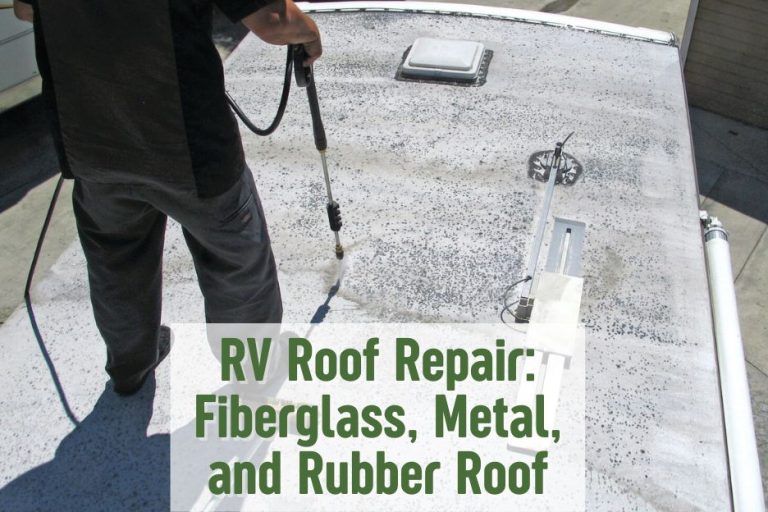What’s the Difference Between an RV and a Camper?
There are many different types of RVs and Camper trailers. The easiest way to tell them apart is by looking at the size and weight.
The other difference between an RV and camper trailer would be the setup of the living space. Most RVs have two beds in one room with a kitchen on one side of the vehicle, while most campers sleep four people in bunks with cooking facilities down below.
Table of Contents
What is an RV?
An RV is a recreational vehicle that includes living space and can be towed by a car. Popular RVs include vans, motorhomes, fifth wheels and travel trailers or campers.
By definition, an RV includes living quarters for people to sleep in. Campers are sometimes modified to provide sleeping spaces for multiple people, but lack the amenities of a true RV.
What Is a Camper?
A camper is like an RV except it lacks the towing portion and has only one large room to sleep in. A camper has no motor or engine of its own to power it, relying on being towed by another vehicle–usually a car–to provide locomotion.
It’s possible for some larger campers to accommodate more than one additional vehicle at the campsite because they do not have their own power source. It should be noted that most campers are smaller than RVs because they rely on being towed by other vehicles which usually have lower towing limits than larger motorhomes.
Differences in Size, Feature and Amenities Between Rvs and Campers
The design differences between an RV and a camper are quite simple. An RV is designed to contain living quarters for the driver and passengers, while a camper does not include this critical feature. Campers are sometimes modified with couches or other sleeping arrangements which serve only as temporary solutions during camping trips.
When it comes to amenities, size matters! Many RVs include full kitchens with standard appliances such as microwaves, ovens, sinks, storage space and countertops plus comfortable living spaces that may have television sets, pull out sofas or recliners to relax in after a long day of hiking or fishing.
Camper trailers usually have small cooking facilities consisting of at least one stovetop burner along with the smallest refrigerators and very limited storage space. Some larger campers may even include things like washer and dryer units to make camping more like home.
Which One Is Better for Me, RV or Camper?
We all have our own opinion. As quoted from the source below, 3 campers share their idea about choosing between RV or camper and their reasons for getting one over the other: “Camper vans (a.k.a pop-up trailers) are much cheaper than RVs and better for weekend trips.
It’s easier to go backpacking with a camper because we can drive out to a lake and hike past the forest road where most people wouldn’t be able to tow their RVs without extensive modifications”.
“RVs are more difficult to maneuver on narrow trails but they make up for it by having entirely different amenities such as satellite TV, high quality kitchens, queen sized beds etc.”
“I like both because they each have their own uses. RVs can travel long distances on the interstate at high speeds and they’re great for exploring a new city whereas campers are more appropriate for low impact camping trips to lakes or mountains. It all comes down to how far you want to drive, if you need things like satellite TV, storage space etc.”
Differences in Costs Between an RV and a Camper
The difference between an RV and a camper is most apparent when it comes to cost. Campers typically range from $1,000-$2,500 depending on condition and features such as cooking facilities, size of refrigerator and sleeping accommodations.
On the other hand RVs start at around $10,000. However there are many available RVs priced below $5,000 that still include all of the features necessary for comfortable travel.
Pros and Cons of Each Type of Vehicle
Pros – Camper vans (a.k.a pop-up trailers) are much cheaper than RVs and better for weekend trips. It’s easier to go backpacking with a camper because we can drive out to a lake and hike past the forest road where most people wouldn’t be able to tow their RVs without extensive modifications.
Cons – RVs are more difficult to maneuver on narrow trails but they make up for it by having entirely different amenities such as satellite TV, high quality kitchens, queen sized beds etc.
Pros – I like both because they each have their own uses. RVs can travel long distances on the interstate at high speeds and they’re great for exploring a new city whereas campers are more appropriate for low impact camping trips to lakes or mountains. It all comes down to how far you want to drive, if you need things like satellite TV, storage space etc.
Cons – RVs are much more expensive than campers and they also require a lot more maintenance and preparation before each trip because of their size and length. On the other hand, campers do not come with cooking facilities which means additional expenses for purchasing stoves, propane tanks and other accessories that make mealtime simpler.”
How to Buy the Right One for You
Whenever you’re looking into buying an RV or camper it’s important to keep in mind what they’re most often used for. If you live near the city and don’t need to drive more than 5 hours at a time.
Then perhaps a larger RV with all of the bells and whistles would be best suited for your family. However, if you enjoy taking long treks out in the wilderness you’ll want to invest in something more lightweight like a camper so that it can be towed by your car.
Benefits of Owning an RV/Camper
There are many reasons why people invest in RVs and campers. Maybe they love to take their family on road trips, or maybe they like long camping excursions through the countryside.
Some may even enjoy running a business that involves transporting workers and equipment from one construction site to another. No matter what reason you have for investing in an RV/camper, there are certain benefits associated with each of them:
Personal Use
Owning a recreational vehicle is a great way to enjoy activities such as kayaking, fishing or even mountain climbing out in nature without having to drive several hours just to get to your destination .
Outdoor Recreation
Camping has become very popular over the past several years as more people embrace the wonderful opportunity to reconnect with nature. It’s a great way to bond as a family and enjoy the outdoors by pitching a tent and roasting marshmallows over an open fire.
Family Reunions
RVs make it easier for family members who live far apart from each other to come together for special events such as graduations, weddings or even birthdays all while enjoying their time together under one roof .
Business Use
Some people like to run a business that involves transporting workers and equipment from one construction site to another. Owning an RV provides these individuals with the ability to stay on site without having to worry about where they’ll sleep or what bathroom they’ll use at night.”
Requirements/Concerns Required To Own One
- Make sure your car can tow the weight! If you’re planning on purchasing an RV or camper then it’s important that you read up on how much your car can actually tow before making any purchases because this will save you a lot of time, money and frustration in the long run.
- Check insurance policies – some companies may not cover accidents where an RV is damaged so be sure to check with your provider beforehand.
- Read recalls/warnings – It’s also important to contact both the manufacturer and agency responsible for recalling RVs so that you know which ones are safe to use while others should be taken off the market immediately.”
Pros and cons to owning a Camper or RV
There are pros and cons to owning a Camper or RV/camper which includes the amount of space available, price, reliability, storage space on board for food or camping supplies, etc.
However there are some distinct advantages that come associated with owning an RV/camper including being able to travel anywhere in it while enjoying all of the appliances you have at home while also having extra storage. Some other benefits include:
Advantages Associated With Owning an RV/Camper
- A bathroom inside the unit so privacy is included.
- Having your own bed means no one can hog it!
- Great for traveling with children since they have their own
If you’re not sure if an RV/camper is the right choice for you, then opt to rent one instead! There are many benefits including:
- The opportunity to try out different types of campers before choosing which one suits you best.
- Units come with all appliances and features available (generally) so renters don’t miss out on anything.
- Being able to save money throughout the year by only paying when needed. Some other benefits include:
Conclusion
If you’re someone who loves the outdoors and longs to escape into nature, but doesn’t want to give up all of your creature comforts, camping may be for you. Camping is an enjoyable way to get away from it all without sacrificing too many conveniences.
You can take your RV or camper out in the wilderness and still enjoy amenities like running water, electricity, a refrigerator/freezer (or ice chest), stovetop burners for cooking outside on campfires or grills; maybe even satellite TV!
The options are endless when it comes to choosing what kind of camping experience suits your needs best. Which do you prefer? An RV or a camper? Let us know in the comments below!

I`m a current Law Enforcement Officer working within the Counterterrorism Bureau in New York State. I have been Camping for over 20 years. My styles of camping include tent, car, truck, van, and RV travel trailer. I have a YouTube channel where I teach all types of camping with an entertaining method: https://youtube.com/@TheSmallsRVAdventures






